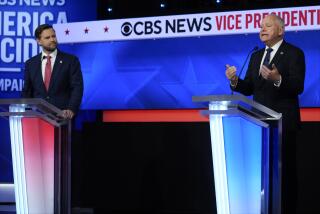With Race the Issue, Dean’s Again a Target
DES MOINES — Democratic presidential rivals jabbed at Howard Dean on Sunday night over his approach to race, taxes and immigration, taking one last shot at the frontrunner in the last debate before next week’s pivotal Iowa caucuses.
Overall, the two-hour Brown and Black Forum was a more genteel event than past debates, as eight of the nine Democratic candidates sought to burnish their credentials and project sunny dispositions in their last-ditch appeal to Iowa voters.
But Dean, who is in a tight race with Missouri Rep. Dick Gephardt, was on the defensive much of the night, faltering several times as he was quizzed about the racial makeup of his Cabinet as governor of Vermont and how he would deal with illegal immigrants.
The Rev. Al Sharpton of New York made the sharpest attack on Dean, asking why he did not appoint African Americans or Latinos to his Cabinet during his 11-year tenure.
“It seems as though you have discovered blacks and browns during this campaign,” said Sharpton, who is African American and who has made race relations a central part of his career.
“We do have African American and Latino workers in state government, including ...” Dean responded.
“No, no, I said your administration,” Sharpton interrupted. “Do you have a senior member of your Cabinet that was black or brown?”
“No, we did not,” Dean finally acknowledged.
It was one of several instances throughout the night in which the Democratic frontrunner seemed at a loss for words. “I will take a back seat to no one in my commitment to civil rights,” he said later.
Several other candidates seized the opportunity to jump into the spotlight. North Carolina Sen. John Edwards, riding a new burst of momentum after receiving the endorsement of the Des Moines Register, dominated much of the evening.
The debate, billed as the nation’s oldest minority presidential forum, was held in one of the least diverse states: More than 92% of its population is non-Hispanic white. But the forum, televised nationwide, gave the candidates an opportunity to address racial and ethnic issues rarely raised on the campaign trail in Iowa and New Hampshire.
Edwards offered a passionate critique of persistent racial inequality in the United States.
“We still live in two Americas, and we should be willing to tell the American people that,” he said.
And former Sen. Carol Moseley Braun, who is black, demonstrated unusual aggressiveness, taking on Gephardt, Edwards and Sharpton on a variety of issues.
“The fact of the matter is you can always blow up a racial debate and make people mad at each other,” she scolded Sharpton over his attack on Dean. “But I think it’s time for us to talk about what are you going to do to bring people together? ... People cannot afford a racial screaming match.”
The two-hour debate, the third of the year, was held at the Polk County Convention Complex and televised on MSNBC. The debate was moderated by Lester Holt of MSNBC and Maria Celeste Arraras of the Spanish-language network Telemundo, and sponsored by the Iowa Brown and Black Forum, a Latino and African American leadership group.
The only candidate missing was retired Army Gen. Wesley K. Clark, who is skipping Iowa to focus on the Jan. 27 New Hampshire primary. In a statement, Clark blamed his absence on “campaign logistics.”
On immigration, many of the candidates said President Bush’s recent initiative to expand the number of guest workers and to help illegal immigrants did not go far enough.
Ohio Rep. Dennis J. Kucinich called the Bush approach “indentured servitude.”
“You know, the Statue of Liberty, the poem at the base didn’t say, ‘Give me your tired, your poor, and we will fingerprint them, we will take their picture and then we will deport them after we’re finished getting their work,’ ” he said.
Connecticut Sen. Joe Lieberman said he would support a raft of changes to immigration policy, including giving driver’s licenses to illegal immigrants, a measure that California Gov. Arnold Schwarzenegger repealed as of Jan. 1.
“It is obviously better for those immigrants and the rest of America that they be driving with a license instead of without one,” Lieberman said.
Under questioning, all of the candidates asserted that neither they nor their families had ever hired an illegal immigrant.
When asked if he would automatically grant citizenship to immigrants who serve in the military, Dean stumbled on a question he has answered with ease numerous times.
“My attitude is if you join the Army, yes, it should give you an absolute path to earned legalization or citizenship,” he said. But he cautioned that he did not want the all-volunteer armed forces to become “the haven for people who are struggling to get by because they happen to be Hispanic.”
Massachusetts Sen. John F. Kerry called Dean’s answer tentative, saying “anybody who serves the United States of America, who is a legal immigrant, ought to get automatic citizenship immediately.”
Later, Gephardt pressed Dean to explain how he would provide tax relief to the middle class through a payroll tax cut without undermining Social Security.
“If we end up cutting payroll taxes, which is the most regressive tax there is for low- and moderate-income workers, it will come out of the general fund in the form of a tax credit,” Dean responded. “We will not touch Social Security.”
*
Times staff writer Maria La Ganga and Times researcher Susannah Rosenblatt contributed to this report.
More to Read
Get the L.A. Times Politics newsletter
Deeply reported insights into legislation, politics and policy from Sacramento, Washington and beyond. In your inbox three times per week.
You may occasionally receive promotional content from the Los Angeles Times.










